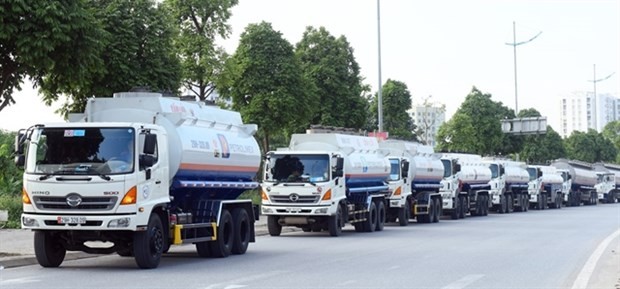
Fuel price cycle to be shortened, removed in the long run
Latest
 |
| Fuel tankers at a depot in the outskirts of Hanoi. (Photo: VNA) |
Some industry experts and traders have long supported a shorter price cycle, saying it will solve the discrepancy between fuel prices in the domestic and international markets and be more in sync with fuel trading activities.
Nguyen Tien Thoa from the Vietnam Valuation Association, said the 10-day price cycle has shown a number of shortcomings and limitations in balancing the interests of fuel traders, retailers and consumers.
Shorter price cycles, 3-5 days at most, are only the first step in bringing domestic fuel prices to the same level as the international market, eliminating a delay that encourages some traders to hold onto their stocks to wait for higher prices.
Economist Vu Vinh Phu said the delay, at times, created a situation in which traders purchased fuel at higher prices but were forced to sell at a lower price point. In addition, retailers were also discouraged as their bonuses were slashed if prices stayed low.
It's simply not possible for traders to sustain the current 10-day cycle as prices continued to fluctuate almost daily in the international market.
"We must start making the transition to a full market-driven mechanism, one in which prices can be adjusted every 5 days or even every day. It's in the best interest of all stakeholders including traders, retailers and consumers," he said.
A 10-day price cycle will just discourage traders from stocking fuel out of fear of financial losses, according to Phu.
Meanwhile, some voiced their concerns over letting go of all measures to manage fuel prices, saying the domestic market was not yet saturated enough with just a few large traders and therefore, not suitable for a fully market-driven approach.
Le Quoc Phuong, former Deputy Director of the Vietnam Industry and Trade Information Centre under the MoIT, said it's prudent to gradually reduce the duration of each price cycle, first bringing it down from 10-day to 5-day.
"It will give us the best of both worlds, allowing ministries to intervene in extraordinary situations while making it easier for traders and retailers to operate," he said.
It's important to note that fuel prices play a large role in the government's effort to rein in inflation, manage CPI and other macroeconomic factors.
Ngo Tri Long, former Head of the Institute for the Study of Market and Price under the Ministry of Finance, said while it's clear that the current price cycle's duration must be shortened as much and as early as possible the Government must also realistically evaluate its ability to intervene when intervention is needed.
From a macroeconomic standpoint, a laissez-faire approach to fuel prices, while may benefit traders, retailers and, to some extent, consumers, will make it that much more difficult for the Government to control inflation and import/export activities.
They called for scientific studies to be conducted before running a pilot programme, small in scale, to gather additional data before nationwide implementation. Another top priority should include the expansion of the country's fuel storage to be able to cover at least 3-6 months of need, creating a larger safe margin on the supply side.

















